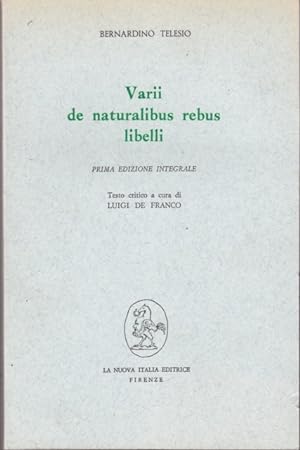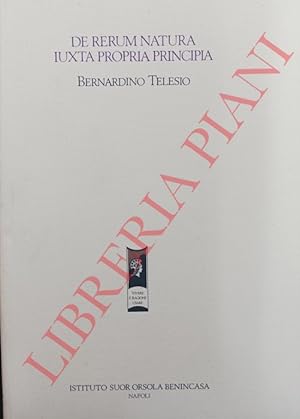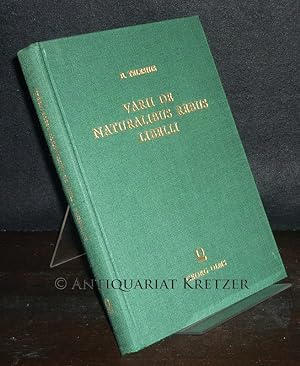telesio bernardino (5 Ergebnisse)
Produktart
- Alle Produktarten
- Bücher (5)
- Magazine & Zeitschriften
- Comics
- Noten
- Kunst, Grafik & Poster
- Fotografien
- Karten
-
Manuskripte &
Papierantiquitäten
Zustand
- Alle
- Neu
- Antiquarisch/Gebraucht
Einband
Weitere Eigenschaften
- Erstausgabe (2)
- Signiert
- Schutzumschlag
- Angebotsfoto
Land des Verkäufers
Verkäuferbewertung
-
Varii de naturalibus rebus libelli
Verlag: La Nuova Italia Ed., 1981
ISBN 10: 8820442914ISBN 13: 9788820442910
Anbieter: Librodifaccia, Alessandria, AL, Italien
Buch
Zustand: Buone. Condizioni dell'esterno: Discrete con difetti, bruniture Condizioni dell'interno: Buone.
-
De rerum natura iuxta propria principia.
Erscheinungsdatum: 1989
Anbieter: Libreria Piani, Monte San Pietro, BO, Italien
Buch
Napoli, Istituto Suor Orsola Benincasa, 1989 (ma anastatica dell'edizione Cacchi del 1570), 8vo tutta tela editoriale con sovraccoperta, cofanetto telato editoriale, pp. XIV-207. Ottimo stato.
-
Varii de naturalibus rebus libelli. Con una introduzione a cura di Cesare Vasoli.
Verlag: Hildesheim & New York: Olms, 1971
Anbieter: Antiquariat Kretzer, Kirchhain, Deutschland
Buch
Zustand: Sehr gut. Sehr gut erhaltenes Exemplar. la Gewicht in Gramm: 990 8° (17,5-22,5 cm). Orig.-Leinenband mit goldgeprägtem Rücken- und Deckeltitel. [Hardcover / fest gebunden]. Repografischer Nachdruck der Ausgabe Venedig 1590.
-
Napoli, Apud Iosephum Cacchium, 1570. 4to. Bound in 18th century marbled boards. Completely fresh and clean copy. Two small marginal holes to last two leaves, far from affecting text. Good, wide margins. Telesio's woodcut title-device (a beatiful naked woman, all alone, far from the troubles of the world, illuminated by the sun, surrounded by a border carrying the saying in Greek: "mona moi fila" - presumably depicting the goddess of Truth), and 11 lovely, illustrated woodcut initials. 12 ff. The rare first edition of one of Telesio's smaller scientific treatises, his treatise on the sea, which was based on purely empirical knowledge. The work constitutes a corrective to Aristotle and a continuation of his magnum opus on the things of nature, the important second edition of which was printed in the same year, also by Cacchium. The empiricism that Telesio propounds in his novel, empirically based scientific treatises, like the "De Mare", caused him to be to be considered "the first of the moderns" (Francis Bacon),"Bernardino Telesio (1509-1588) belongs to a group of independent philosophers of the late Renaissance who left the universities in order to develop philosophical and scientific ideas beyond the restrictions of the Aristotelian-scholastic tradition. Authors in the early modern period referred to these philosophers as 'novateurs' and 'modern'. In contrast to his successors Patrizzi and Campanella, Telesio was a fervent critic of metaphysics and insisted on a purely empiricist approach in natural philosophy-he thus became a forerunner of early modern empiricism. He had a remarkable influence on Tommaso Campanella, Giordano Bruno, Pierre Gassendi, Francis Bacon, Thomas Hobbes and authors of the clandestine Enlightenment like Guillaume Lamy and Giulio Cesare Vanini." (SEP).Telesio was born in Cosenza "and in a sense he opens the long line of philosophers through which the South of Italy has asserted its Greek heritage, a line that links him with Bruno and Campanella, with Vico in the eighteenth century, and with Croce and Gentile in our own time." (Kristeller, Eight Philosophers, p. 97). He was educated by his uncle, the humanist Antonio Telesio, in Milan and Rome, and he studied philosophy and mathematics at the university of Padua, where he got his doctorate in 1535. He had a great respect for the famous Aristotelian Vicenzo Maggi, with whom he discussed his magnum opus, obtaining his approval before publishing the seminal second version of it in 1570. He was closely connected not only with Maggi, but also with the other leaders of the most intelligent and official Aristotelianism of his age. But Telesio opposes the Aristotelianism of both his own and earlier times, claiming that they all erected arbitrary systems that consisted of a strange mixture of reason and experience. They created their systems without consulting nature, and thus they merely obtained arbitrary ideas of the world. What separates Telesio and his contemporaries from the great Renaissance thinkers that had gone ahead is not merely the passing of a few decades, but the emergence of a completely different intellectual atmosphere. "The tradition of medieval thought, which was still felt very strongly in the fifteenth century and even at the beginning of the sixteenth, began to recede into the more distant background, and it was now the tbroad thought and learning of the early Renaissance itself which constituted the tradition by which the new generations of thinkers were shaped, and against which their immediate reactions were directed." (Kristeller, Eight Philosophers, p. 91). Telesio belongs to a group of thinkers that we call the Renaissance philosophers of nature. They are considered a group by themselves, different from the humanists, Platonists, and Aristotelians that we usually group other Renaissance thinkers into. What distinguished these philosophers of nature, however, was not a different subject matter from that of the Aristotelians and the Platonists (of both contemporary and earlier times), but their clear claim to explore the principles of nature in an original and independent way, tearing themselves loose of an established tradition and authority that kept them in binds. They formulated novel theories andfreed themselves from the ancient philosophical authorities, especially Aristotle, who had dominated philosophical speculation, not least natural philosophy, for centuries. Telesio, of course, did not stand alone in this group of bold, original thinkers that we call the Renaissance philosophers of nature, and whose quest it was to make new discoveries and to attain knowledge unaccessible to the ancients, it also included for instance Fracastoro, Cardano, Paracelsus, and Bruno. But Telesio in particular protrudes, as his thought is distinguished by such clarity and coherence, and his ideas anticipate important aspects of later philosophy and science. "Telesio dedicated his whole life to establishing a new kind of natural philosophy, which can be described as an early defense of empiricism bound together with a rigorous criticism of Aristotelian natural philosophy and Galenic physiology. Telesio blamed both Aristotle and Galen for relying on elaborate reasoning rather than sense perception and empirical research. His fervent attacks against the greatest authorities of the Western philosophical and medical traditions led Francis Bacon to speak of him as "the first of the moderns" (Opera omnia vol. III, 1963, p. 114). He was perhaps the most strident critic of metaphysics in late Renaissance times. It was obviously due to his excellent relationships with popes and clerics that he was not persecuted and was able during his own lifetime to publish his rather heterodox writings, which went on the index shortly after his death." (SEP)."Giordano Bruno speaks of the "giudiciosissimo Telesio" in the third dialog of "De la causa", whilst Francis Bacon based his own speculative philosophy of nature on a blend of.
-
Napoli, Apud Iosephum Cacchium, 1570. 4to. Contemporary limp vellum with handwritten title to spine. Remains of old paper-labels to top and bottom of spine. Spine with loss of ab. 3x2 cm. of vellum to middle, not affecting the book block, which is sound and fine underneath. Some soiling to binding, but all in all fine and unrestored, albeit a bit loose. Some brownspotting to title-page (not heavy), otherwise just a bit of scattered brownspotting. All in all internally very nice and clean, and with good, wide margins. Old owner's name (Juliani Riccii) to front free end-paper and title-page, which also has his inventory number in neat hand: "no/ 634"). Telesio's woodcut title-device (a beatiful naked woman, all alone, far from the troubles of the world, illuminated by the sun, surrounded by a border carrying the saying in Greek: "mona moi fila" - presumably depicting the goddess of Truth), and numerous lovely, illustrated woodcut initials throughout. 95 ff. The rare and important first edition thus, being the much enlarged (by treatises on specific questions of natural philosophy) and revised second edition and the first edition under the canonical title "De Rerum Natura" (clearly referring to Lucretius's great work), of Telesio's revolutionizing main work, which established a new kind of natural philosophy and earned him the reputation as "the first of the moderns" (Francis Bacon). The work is a manifesto for natural philosophy emancipated from peripatetic rationalism, expressed clearly in the subtitle to the first book of the work: "the structure of the world and the nature and magnitude of bodies contained in itare not to be sought from reason, as the ancients did" they must be perceived from sensation and treated as being things themselves." (translation of the Latin of the present work, p. 2). "Taken as a whole, the book is a frontal assault on the foundations of Peripatetic philosophy accompanied by a proposal for replacing Aristotelianism with a system more faithful to nature and experience." (Copenhaver & Schmitt, p. 311). Telesio's "De Rerum Natuna" constitutes one of the first serious attempts to replace Aristotle's natural philosophy, and his seminal, novel theory of space and time anticipates Newton's absolute time and absolute space. It furthermore even seems that it is in the present work that the word "space" ("spatium") is used for the first time to determine what we now mean by space - thus Telesio has here created an entirely new terminology for one of the single most important phenomenons within physics, astronomy, philosophy, etc., giving to it a terminological precision that is unprecedented and which has influenced the entire history of science and philosophy. "[i]n some of his characteristoc theories, Telesio appears as a direct or indirect forerunner of Newton and Locke." (Kristeller, Eight Philosophers, p. 107). "Bernardino Telesio (1509-1588) belongs to a group of independent philosophers of the late Renaissance who left the universities in order to develop philosophical and scientific ideas beyond the restrictions of the Aristotelian-scholastic tradition. Authors in the early modern period referred to these philosophers as 'novateurs' and'modern'. In contrast to his successors Patrizzi and Campanella, Telesio was a fervent critic of metaphysics and insisted on a purely empiricist approach in natural philosophy-he thus became a forerunner of early modern empiricism. He had a remarkable influence on Tommaso Campanella, Giordano Bruno, Pierre Gassendi, Francis Bacon, Thomas Hobbes and authors of the clandestine Enlightenment like Guillaume Lamy and Giulio Cesare Vanini." (SEP).Telesio was born in Cosenza "and in a sense he opens the long line of philosophers through which the South of Italy has asserted its Greek heritage, a line that links him with Bruno and Campanella, with Vico in the eighteenth century, and with Croce and Gentile in our own time." (Kristeller, Eight Philosophers, p. 97). He was educated by his uncle, the humanist Antonio Telesio, in Milan and Rome, and he studied philosophy and mathematics at the university of Padua, where he got his doctorate in 1535. He had a great respect for the famous Aristotelian Vicenzo Maggi, with whom he discussed his magnum opus, obtaining his approval before publishing the seminal second version of it in 1570. He was closely connected not only with Maggi, but also with the other leaders of the most intelligent and official Aristotelianism of his age. But Telesio opposes the Aristotelianism of both his own and earlier times, claiming that they all erected arbitrary systems that consisted of a strange mixture of reason and experience. They created their systems without consulting nature, and thus they merely obtained arbitrary ideas of the world. What separates Telesio and his contemporaries from the great Renaissance thinkers that had gone ahead is not merely the passing of a few decades, but the emergence of a completely different intellectual atmosphere. "The tradition of medieval thought, which was still felt very strongly in the fifteenth century and even at the beginning of the sixteenth, began to recede into the more distant background, and it was now the tbroad thought and learning of the early Renaissance itself which constituted the tradition by which the new generations of thinkers were shaped, and against which their immediate reactions were directed." (Kristeller, Eight Philosophers, p. 91). Telesio belongs to a group of thinkers that we call the Renaissance philosophers of nature. They are considered a group by themselves, different from the humanists, Platonists, and Aristotelians that we usually group other Renaissance thinkers into. What distinguished these philosophers of nature, however, was not a different subject matter from that of the Aristotelians and the Platonists (of both contemporary and earlier times), but their clear claim to explore the principles of nature in an original and independent w.





![Bild des Verkäufers für De Mari, Liber Unicus. Ad Illustriss. Ferdinandum Carrasam Soriani Comitem. - [PAVING THE WAY FOR EMPIRICISM] zum Verkauf von Lynge & Søn ILAB-ABF](https://pictures.abebooks.com/inventory/md/md8035585634.jpg)
![Bild des Verkäufers für De Rerum Natura iuxta propria principia, Liber Primus, & Secundus, denuò editi. - [THE MANIFESTO OF NATURAL PHILOSOPHY - DEFINING "SPACE" FOR THE FIRST TIME PROPER] zum Verkauf von Lynge & Søn ILAB-ABF](https://pictures.abebooks.com/inventory/md/md10120242070.jpg)